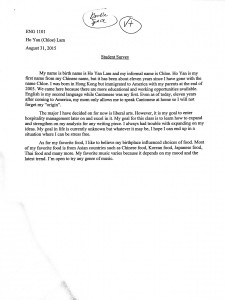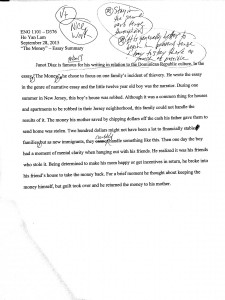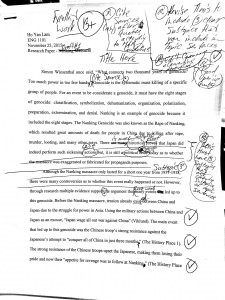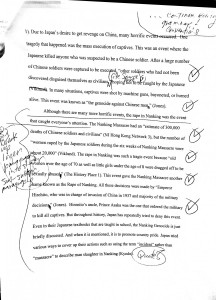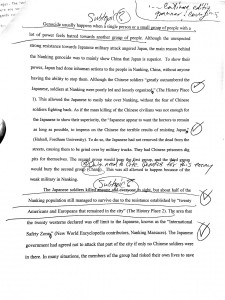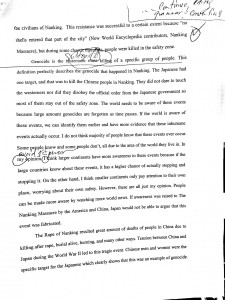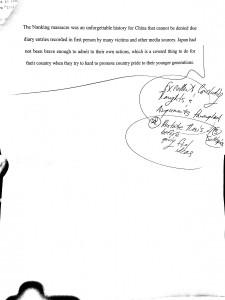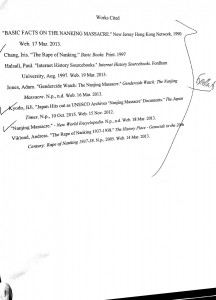Category Archives: Uncategorized
Research Paper Final
Ho Yan Lam
ENG 1101
December 15, 2015
Research Paper Draft 2
The Forgotten Genocide
Simon Wiesenthal once said, “What connects two thousand years of genocide? Too much power in too few hands,” (Wiesenthal). Genocide is the systematic mass killing of a specific group of people. For an event to be considerate genocide, it must have the eight stages of genocide: classification, symbolization, dehumanization, organization, polarization, preparation, extermination, and denial. Nanking is an example of genocide because it included the eight stages. The Nanking Genocide was also known as the Rape of Nanking, which resulted great amounts of death for people in China due to killing after rape, murder, looting, and many other ways. There is much historical proof that Japan did indeed perform such sickening actions and such actions are defined as a genocide but, it is still a political issue today as to whether the massacre was exaggerated or fabricated for propaganda purposes.
There are many arguments behind whether the Nanking Genocide occurred or not but through research, multiple evidence supports the argument that there were many events led up to this genocide. Although the Nanking massacre only lasted for a short one year from 1937-1938, there were many controversies as to whether this event really happened or not. Before the Nanking massacre, tension already existed between China and Japan due to the struggle for power in Asia. Using the military actions between China and Japan as an excuse, “Japan wage all out war against China” (Viklund). The main event that led up to this genocide was the Chinese troop’s strong resistance against the Japanese’s attempt to “conquer all of China in just three months” (The History Place 1). The strong resistance of the Chinese troops upset the Japanese, making them losing their pride and now their “appetite for revenge was to follow at Nanking” (The History Place 1). Due to Japan’s desire to get revenge on China, many horrific events occurred. One tragedy that happened was the mass execution of captives. This was an event where the Japanese killed anyone who was suspected to be a Chinese soldier. After a large number of Chinese soldiers were captured to be executed, “other soldiers who had not been discovered disguised themselves as civilians” (Chang) hoping not to be caught by the Japanese (Viklund). In many situations, captives were shot by machine guns, bayoneted, or burned alive. This event was known as “the genocide against Chinese men” (Jones).
The Nanking Genocide definitely occurred because it remained as a horror in many people’s memory even till today. The Nanking Massacre had an “estimate of 300,000 deaths of Chinese soldiers and civilians” (NJ Hong Kong Network 3), but the number of “women raped by the Japanese soldiers during the six weeks of Nanking Massacre were about 20,000” (Viklund). The rape in Nanking was such a tragic event because “old women over the age of 70 as well as little girls under the age of 8 were dragged off to be sexually abused” (The History Place 1). This event gave the Nanking Massacre another name known as the Rape of Nanking. All these decisions were made by “Emperor Hirohito, who was in charge of invasion of China in 1937 and majority of the military decisions” (Jones). Hironito’s uncle, Prince Asaka was the one that ordered the military to kill all captives. But throughout history, Japan has repeatedly tried to deny this event. Even in their Japanese textbooks that are taught in school, the Nanking Genocide is just briefly discussed. And when it is mentioned, it is to promote country pride. Japan tried various ways to cover up their actions such as using the term “incident” rather than “massacre” to describe man slaughter in Nanking (Kyodo).
Genocide usually happens when a single person or a small group of people with a lot of power feels hatred towards another group of people and this definition applied to the Nanking Massacre. Although the unexpected strong resistance towards Japanese military attack angered Japan, the main reason behind the Nanking genocide was to mainly show China that Japan is superior. To show their power, Japan had done inhuman actions to the people in Nanking, China, without anyone having the ability to stop them. Although the Chinese soldiers “greatly outnumbered the Japanese, soldiers at Nanking were poorly led and loosely organized” (The History Place 1). This allowed the Japanese to easily take over Nanking, without the fear of Chinese soldiers fighting back. As if the mass killing of the Chinese civilians was not enough for the Japanese to show their superiority, the “Japanese appear to want the horrors to remain as long as possible, to impress on the Chinese the terrible results of resisting Japan” (Halsall, Fordham University). To do so, the Japanese had not removed the dead from the streets, causing them to be grind over by military trucks. They had Chinese prisoners dig pits for themselves. The second group would bury the first group, and the third group would bury the second group. This was all allowed to happen because of the weak military in Nanking.
Through this genocide, the Japanese soldiers killed anyone and everyone in sight, but about half of the Nanking population still managed to survive due to the resistance established by “twenty Americans and Europeans that remained in the city” (The History Place 2). The area that the twenty westerns declared was off limit to the Japanese, known as the “International Safety Zone” (New World Encyclopedia contributors, Nanking Massacre). The Japanese government had agreed not to attack that part of the city if only no Chinese soldiers were in there. In many situations, the members of the group had risked their own lives to save the civilians of Nanking. This resistance was successful to a certain extent because “no shells entered that part of the city” (New World Encyclopedia contributors, Nanking Massacre), but during some chaotic moments, people were killed in the safety zone.
Genocide is the systematic mass killing of a specific group of people and in this case, Nanking Genocide consisted of Chinese being Japanese’s killing target. Chinese was in fact their only target. They did not dare to touch the westerners nor did they disobey the official order from the Japanese government so most of them stay out of the safety zone. The world needs to be aware of these events because large amount genocides are forgotten as time passes. If the world is aware of these events, we can identify them earlier and have more evidence that these inhumane events actually occur. I do not think majority of people know that these events ever occur. Some people know and some people don’t, all due to the area of the world they live in. Viewing this from an outsider perspective, many probably believe larger continents have more awareness to these events because it is probably more connected to the rest of the world. If the large countries know about these events, they should make the initiative to step in and stop these events. On the other hand, smaller continents most likely only pay attention to their own place, worrying about their own safety. However, an outsider’s words can never be taken as a fact. People can be made more aware by watching more world news. If awareness was raised to The Nanking Massacre by the America and China, Japan would not be able to argue that this event was fabricated.
Historical sources provides a pretty clear view to the world that the Nanking Massacre did happen and such evidence gave labeled this tragic event as a genocide that Japan is still trying to deny today. The Rape of Nanking resulted great amount of deaths of people in China due to killing after rape, burial alive, burning, and many other ways. Tension between China and Japan during the World War II led to this tragic event. Chinese men and women were the specific target for the Japanese which clearly shows that this was an example of genocide. The Nanking massacre was an unforgettable history for China that cannot be denied due diary entries recorded in first person by many victims and other media sources. Japan had not been brave enough to admit to their own actions, which is a coward thing to do for their country when they try to hard to promote country pride to their younger generations.
Works Cited
“BASIC FACTS ON THE NANKING MASSACRE.” New Jersey Hong Kong Network, 1990. Web. 17 Mar. 2013.
Chang, Iris. “The Rape of Nanking.” Basic Books. Print. 1997
Halsall, Paul. “Internet History Sourcebooks.” Internet History Sourcebooks. Fordham University, Aug. 1997. Web. 19 Mar. 2013.
Jones, Adam. “Gendercide Watch: The Nanjing Massacre.” Gendercide Watch: The Nanjing Massacre. N.p., n.d. Web. 16 Mar. 2013.
Kyodo, JiJi. “Japan Hits out as UNESCO Archives ‘Nanjing Massacre’ Documents.” The Japan Times. N.p., 10 Oct. 2015. Web. 15 Nov. 2012.
“Nanjing Massacre.” – New World Encyclopedia. N.p., n.d. Web. 18 Mar. 2013.
Viklund, Andreas. “The Rape of Nanking 1937-1938.” The History Place – Genocide in the 20th Century: Rape of Nanking 1937-38. N.p., 2005. Web. 14 Mar. 2013.
Wiesenthal, Simon ” BrainyQuote.com. Xplore Inc, 2015. 15 December 2015.
Free-Write #4 (I Remember Poem)
I remember the first time I refused to drink milk.
I remember my sister telling me about the first time I sleep walked.
I remember having the same nightmare for almost two years of my life. I was being chased and kidnapped by a mysterious shadow while I was walking behind my mother.
I remember the first time I learned how to do a cartwheel.
I remember the first time I did a split as straight as the lines on the floor.
I remember the time my mom forgot to pick me up from school.
I remember the time my mom brought be McDonald for lunch at school.
I remember the first time I went on a plane, I got plane sick.
I remember getting plane sick every time after the first.
I remember being on a boat during a storm and I couldn’t see the water from my seat.
I remember the first time I returned the serve my tennis coach made.
I remember the nervousness right before jumping down the platform and into 10 feet deep water.
I remember the first time I swam in the ocean in Hong Kong and I held on to a little girl half my size.
I remember the excitement from the first concert I attended at Madison Square Garden.
I remember my favorite stuffed monkey foll ripping, the one that I got for my 8th birthday.
I remember my childhood.
Free-Write #3
It was just yesterday when I almost lost a member in my family and by that, I mean literally. It was a sunny Sunday afternoon when I woke up around 12 pm. My daily routine is to feed my cats as soon as I wake up but on that day, I found it off that only two of them ran towards me when I gave them food. The chubbiest one, the one who likes to eat the most, didn’t show up. I searched my whole house, under the sofa, in every room, the bathroom, closet, and still she was nowhere to be found. When I searched outside the house thinking she might of escaped, I was right. At first I wasn’t sure but then I saw the grass moving in the front lawn by the parked car. And there she was, having the best time of her life, eating some grass that could’ve easily gotten her killed if it was poisonous. When I tried to grab her home, she started playing hide and seek with me. Now you can probably imagine how I looked, a girl in her pajamas, hair all messy, and looking under a car by the grass, looking crazy. I had to get down on the filthy and wet concrete sidewalk, crawl half way under the car, and drag my overweight 15 pound cat out. I learn to never take my cats out on a stroll anymore because they like it so much that they’ll try to run away from home.
Free-Write #2
Early morning, 9:00 am, my restless sleep was interrupted even more by the sound of multiple ambulance and my alarm. That’s my everyday life of living a block away from the hospital, red and blue light flashing into my room and through my tightly shut eye lids and waking up in the most irritating way possible. When I was conscious enough to roll out of bed, I realized how uncomfortably cold my room was from the air conditioner, to which I swore I turned off in the middle of the night. Stumbling out my room and over three cats, I began to wash up. It was already 9:30 am and I needed to make my way out the door in 15 minutes. A rushed morning is never a good morning, especially when I felt like I was being chased by police cars and ambulance in my sleep. I almost can’t remember how I made my way to the F train besides the two blocks I ran when I saw the bus I needed to take was arriving. The hour and a half on the train went by with a sleepy gentleman who had long hair kept hitting his head on the pole next to him. I guess I ended up joining him because when I opened my eyes, the F train was at Jay st – Metrotech. I shuffled through the group of business people in front of me and left the train right before the doors closed. And that’s how I made my way to school this morning.
Free-Write #1
My name is Ho Yan Lam but I usually go by the name Chloe. Ho Yan is my Chinese first time and it’s been about eleven since I’ve been referred to as Chloe. I was born in Hong Kong and came to America at the end of 2003. English is my second language while Cantonese is my primary language.
The major I’ve decided on for now is Liberal Arts. However, it is my goal to enter hospitality management later on and excel in it. My goal for this class is to learn how to expand on my analysis for any writing piece. I always had trouble with expanding my ideas. My goal in life is currently unknown but I would like to end up in a place where I can be stress free and enjoy life.
My birth place might have influenced this but, most of my favorite foods is from Asia. Such as Chinese, Korean, Japanese, Thai, and more.
Student Survey Freewrite
The Money Summary
Research Essay Draft 1
Nanking Genocide Pantoum (Extra Credit)
Ho Yan Lam
English 1101
December 7, 2015
Extra Credit: Pantoum
Topic: Nanking Genocide
It’s a crime against humanity,
And it hits so close to home,
Asians against Asians, China against Japan,
But the complete truth will always be unknown.
And it hits so close to home.
This historic event will forever be an active volcano waiting to erupt.
But the complete truth will always be unknown.
Will learning about this in textbooks make it any less of a crime against humanity?
This historic event will forever be an active volcano waiting to erupt.
It’s a forgotten genocide floating in our world history.
Will learning about this in textbooks make it any less of a crime against humanity?
It’s a crime against humanity, it always will be.



